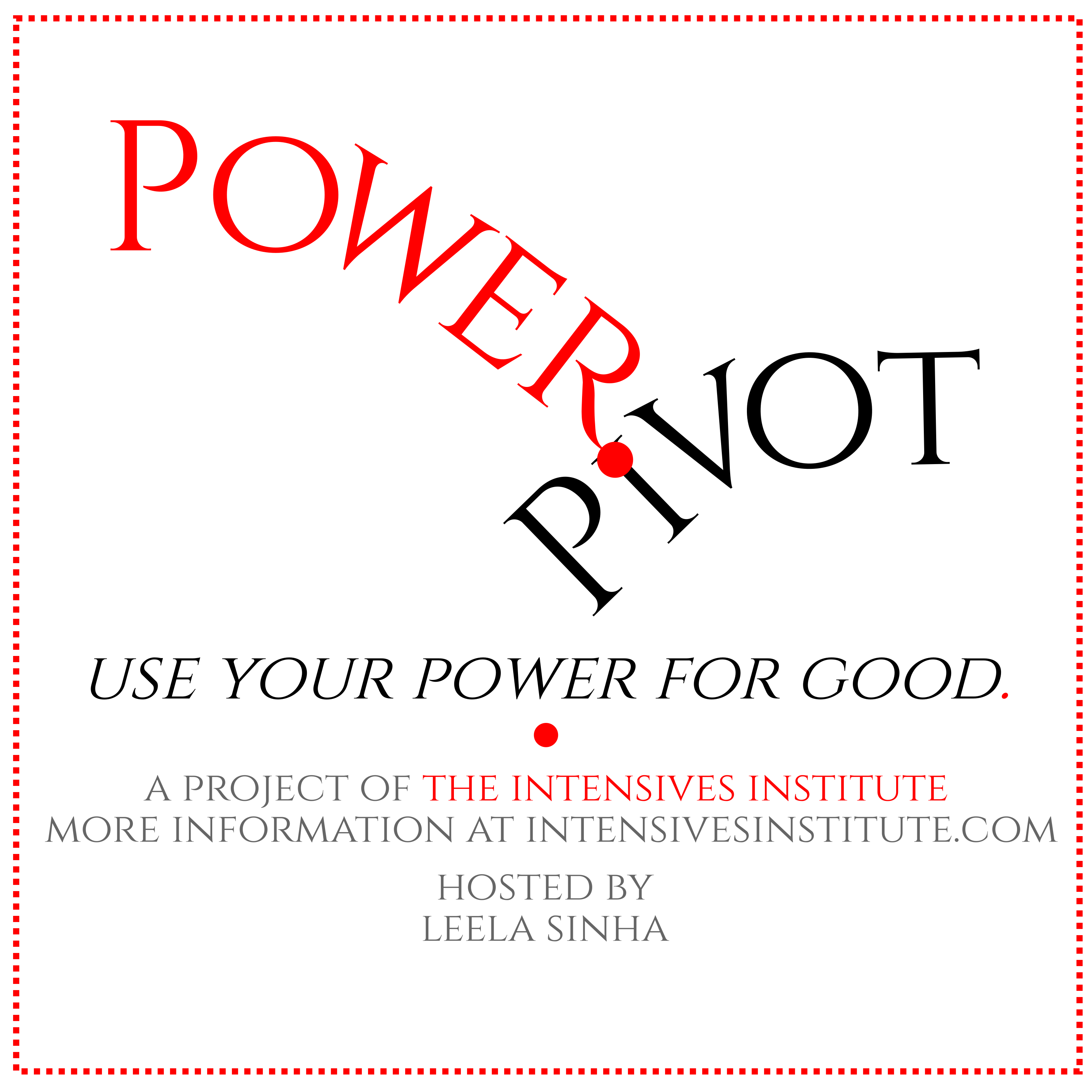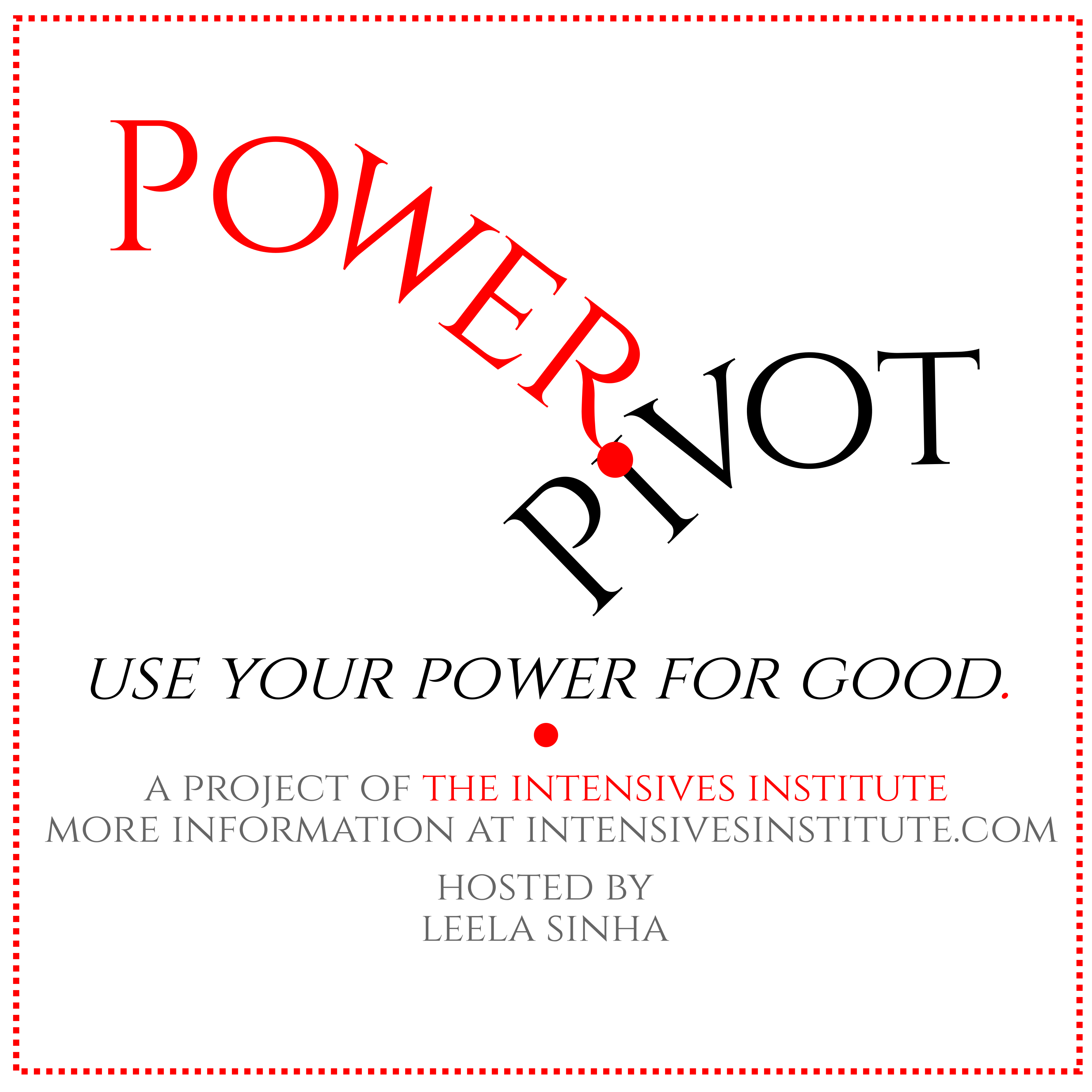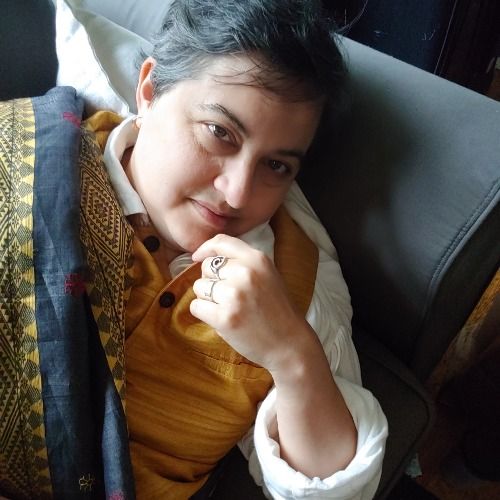Episode 34
kind leadership, good results
What if everybody had "I will not take it out on others" on their top priority list?
Transcript
Hey, everyone, thanks for tuning in. So there
Leela Sinha:are ways in which being a leader is hard. And one of the ways
Leela Sinha:that that's hard is that we have to recognize the amount of
Leela Sinha:influence that we have over the people who are following us.
Leela Sinha:Whether that's the people in our companies, or whether that's our
Leela Sinha:audience, or whether those are our clients and customers, we
Leela Sinha:can have so much influence on the world that we're in. And
Leela Sinha:that means that when we do stuff in public, and by 'in public' I
Leela Sinha:mean anywhere in any of those contexts where others of those
Leela Sinha:people will see us or hear us, we often can mess things up
Leela Sinha:pretty badly. Because we're human, we're made of human and
Leela Sinha:the idea that we're going to be pristinely perfect and above
Leela Sinha:reproach is absurd and outdated. So we can just set that one
Leela Sinha:aside, that's not happening. However, it is fair for us to
Leela Sinha:expect ourselves, and for others to expect us, to do as well as
Leela Sinha:we can under the circumstances in the context of spaces where
Leela Sinha:we have influence. So for example, if I am the leader of a
Leela Sinha:company, and I make a public statement, it's on me to try
Leela Sinha:really hard to make that public statement as undamaging as
Leela Sinha:possible. If I'm a leader of a small company, a micro company,
Leela Sinha:three people, whatever, and I'm meeting with my team, and I'm
Leela Sinha:having a crappy day, for reasons, for any reasons, really
Leela Sinha:even ones related to the company. Taking that out on
Leela Sinha:those people is not going to make the situation better. It's
Leela Sinha:just not, it's not going to improve things, you do not want
Leela Sinha:people scared of you. That's not a way to lead. I know people are
Leela Sinha:going to disagree with me. But I believe that one does not get
Leela Sinha:the best work and especially not the best innovative creative
Leela Sinha:work out of people if they're scared. And when we do decide to
Leela Sinha:let the shit roll downhill, when we do come out of the gate
Leela Sinha:swinging in ways that we shouldn't, then it all
Leela Sinha:eventually collects on the person at the bottom of the
Leela Sinha:chain, whatever that is. So like, you have, you know, like
Leela Sinha:the "Rainy Day Book," which is this, I think, 1950s children's
Leela Sinha:book, little tiny square book, not very many pages, pen and ink
Leela Sinha:and watercolor illustrations. And it's this story about like,
Leela Sinha:the dad sticks his head out the door before he leaves for work,
Leela Sinha:and it's raining. And so he is grumpy and doesn't kiss his wife
Leela Sinha:goodbye. And so his wife is grumpy at the kid and the kid is
Leela Sinha:gru- right like down the chain, a couple more steps. And then we
Leela Sinha:get to the dog who gets like shoved or something, but then
Leela Sinha:comes right back and is like waggy waggy, waggy, waggy lick,
Leela Sinha:lick lick. And the dog turns it around. Right. So then the dog
Leela Sinha:is nice to the kid. So the kid is nice to their siblings, the
Leela Sinha:sibling is nice to the mom, so the mom is nice to the dad,
Leela Sinha:right? And so everybody's happy by the end of the day. But that
Leela Sinha:model is not necessarily the healthiest model because it
Leela Sinha:assumes that the person that's at the bottom of the chain is
Leela Sinha:responsible for making everybody above them happy. Like it's you
Leela Sinha:know, if you can just be happy and kind and sweet and good
Leela Sinha:enough, everybody else around you will feel better. That's not
Leela Sinha:a message I would want to pass on to my kids. Just saying. And
Leela Sinha:that is the message that our culture tends to give. So when
Leela Sinha:we as leaders take responsibility at the top
Leela Sinha:instead, at the beginning, and we say "I am not going to start
Leela Sinha:that process, I am not going to be grumpy at the next person
Leela Sinha:down" in a way that leaves them feeling bad in a way that makes
Leela Sinha:them less resilient, less able to hold whatever happens in
Leela Sinha:their sphere with grace, right, I'm not going to take up that
Leela Sinha:energy from the other people. What I'm going to do is I'm
Leela Sinha:going to own my stuff here, I'm going to keep it with me. I'm
Leela Sinha:going to dispose of it appropriately. I'm going to
Leela Sinha:manage it with my therapist or with my coach or, or with my
Leela Sinha:friend but in a way that is not mean to my friend, I'm just
Leela Sinha:going to say to my friend "Hey, can you can I vent to you for
Leela Sinha:like 20 minutes because I'm so out of sorts and I have a
Leela Sinha:meeting and I don't want to go into that meeting in a bad
Leela Sinha:mood." And most of the time your friend will be like sure you can
Leela Sinha:vent and you can just like talk about what's happening but not
Leela Sinha:be mean to them. And then they can usually hold that space and
Leela Sinha:then you can go into your meeting and it's fine.
Leela Sinha:We need to carry that ethos t hat philosophy, as much as we
Leela Sinha:can. We're all human. But as much as we can, everywhere. And
Leela Sinha:a lot of times especially in small businesses, there's,
Leela Sinha:there's no, there's no second in command, right? There's the
Leela Sinha:founder. And then there are like the three team members. And
Leela Sinha:that's it. And so you can't just say to your deputy, you know,
Leela Sinha:leader, "listen, I'm having a bad day, can you go have that
Leela Sinha:conversation?" Because there's nobody else to have that
Leela Sinha:conversation, it's got to be you. And so you do, and you do
Leela Sinha:the best that you can, hopefully. When it comes to
Leela Sinha:larger companies, right, the influence level just gets
Leela Sinha:magnified. Look at, you know, what if, what if Facebook, were
Leela Sinha:trying to be good? Just trying even? Or what if, what if Uber
Leela Sinha:were just trying to be good? Or what if, you know, what if
Leela Sinha:everybody had in their top priority list, "I will not take
Leela Sinha:it out on others." When a company does that-and people can
Leela Sinha:tell- what happens is that company attract better
Leela Sinha:employees, that company has better employee loyalty, that
Leela Sinha:company has better customer loyalty, that company has often
Leela Sinha:better quality products or services, because the people
Leela Sinha:involved in producing them are happy. They feel respected. They
Leela Sinha:feel like their humanity is important to the leadership of
Leela Sinha:the organization. So we have a choice. As leaders, we can own
Leela Sinha:our stuff, make sure it doesn't roll downhill and build that
Leela Sinha:into the culture of the company. So that at every level of
Leela Sinha:leadership, every leader decides is this useful? Is this
Leela Sinha:effective? Is this going to help? Or is this my frustration,
Leela Sinha:my anger, my bad day from somewhere else, whatever it is,
Leela Sinha:my fear, my anxiety- is that what's at play here? Is that
Leela Sinha:what's going to influence how I present this in this meeting to
Leela Sinha:this person, to the organization itself. When we make those
Leela Sinha:decisions consciously, when we build rituals into our days, and
Leela Sinha:into our systems, that allow us to double-check ourselves before
Leela Sinha:we go into a meeting or at the beginning of a meeting. And to
Leela Sinha:be real with people like you can say, "I'm having a bad day." But
Leela Sinha:then the next thing you say isn't, "so y'all better watch
Leela Sinha:out." The next thing you say is something like "so I'm going to
Leela Sinha:not make some of the decisions we were planning to make today.
Leela Sinha:Because I just don't think that I'm in the right headspace to be
Leela Sinha:making those choices. So we're going to put those choices off
Leela Sinha:until tomorrow. I need to take a break, take some sleep, I know
Leela Sinha:nobody else can make those decisions. So I'm going to have
Leela Sinha:to make them, but not in this headspace. I just- that would
Leela Sinha:not be responsible and I'm not going to do it." When we do that
Leela Sinha:on an individual level, on a leadership level, and on an
Leela Sinha:organizational level, then we start to shift the world toward
Leela Sinha:a better way of being. Is this all a long winded way of saying
Leela Sinha:"own your shit?" Yes. Is it also a reminder that we're all human?
Leela Sinha:Also yes. And we need to find ways of being human that are
Leela Sinha:kind and that allow us to make the world a better place. Thanks


